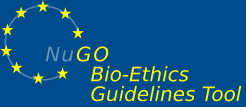- Home
- NuGO Guidelines
-
Definitions
-
Examples
-
Background
-
This is a static version of the NuGO Bioethics Guidelines Tool from 2007. Some links may be outdated. Searching is disabled. Please contact the authors for comments or questions
NuGO Guideline 5
Informed consent
Extent of informed consent for biobanking
The scientific potential of a collection of samples and data in a bio-repository is dependent on the flexibility of its use in research. In this regard, the following two aspects are relevant:
- duration of storage of samples and data
- definition of the research scope for which permission for use of samples and data is granted
Permission of use for an unlimited time within a defined research scope is preferable. Under the circumstance of such a timely unlimited consent, the research volunteer should be informed on a regular basis about research that is being conducted using his or her sample, so that he or she can effectively exert the right to maintain or to withdraw the consent.
A relatively broad definition of the research scope is preferable, i.e. that the consent form refers to groups of genes related to particular pathways or states of health or diseases rather than to a list of specific genes or a particular disease. Adhering to this strategy may obviate the need of renewal of consent for new studies that are within the scope of the original study. However, ethical approval by the domestic ethical committee is necessary in any case.
In cases where the scope of a study is different from the one the research volunteer had agreed to, the volunteer has to be re-contacted and a new informed consent has to be obtained. If the contact (see comment) to the research volunteer can't be made with reasonable efforts (see Guideline 18), the biological material should only be used after an independent evaluation considering the following aspects [see 2, Article 22- 1]:
- importance of the research question,
- aims cannot be achieved using biological material for which consent can be obtained,
- no evidence exists that the research volunteer has opposed to that particular research use.
There is one comment on this page:
As a standard, the purpose and duration of the use of a sample have to be laid out as precisely as possible.
- The scope of intended research can be wide. The donor must however retain their right to withdraw.
By means of a multi-level consent, a donor can chose the width of their consent, which is not a contradiction but an expression of their right of informational self-determination.
[ Comment by Prof. Dr. Michael Krawczak, www.tmf-ev.de, 2007-09-17 12:00:00 ]
